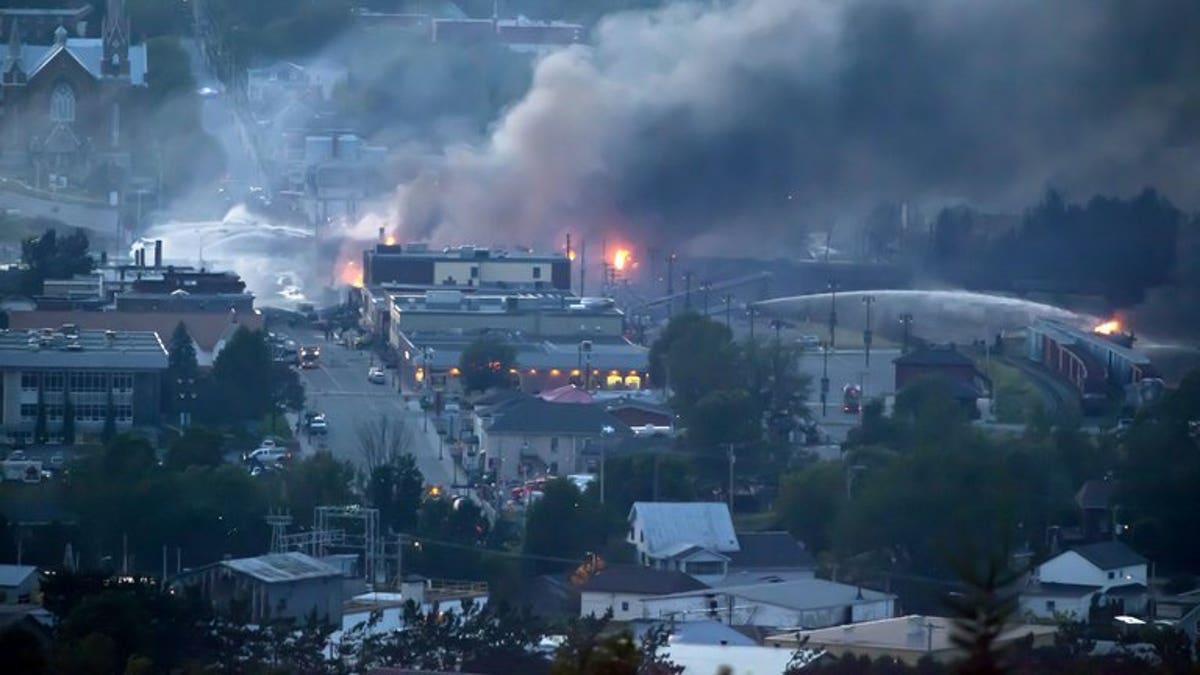
Firefighters douse blazes after a freight train loaded with oil derailed in Lac-Megantic in Canada's Quebec province on July 6, 2013. Canada's Senate called for a full safety review of pipelines, railroads and other means of transporting crude oil, in a report Thursday that also urges better responses to spills. (AFP/File)
OTTAWA (AFP) – Canada's Senate called for a full safety review of pipelines, railroads and other means of transporting crude oil, in a report Thursday that also urges better responses to spills.
"We've been working on these issues for the last nine months and the shocking Lac-Megantic rail disaster has only intensified the need to address hydrocarbon transportation safety," said Senator Richard Neufeld, chair of the standing committee on energy that produced the report.
"In the years ahead, hydrocarbon production will continue to grow and so will transport capacity. That's why we believe Canadians need to know more about what the federal government has in place to protect citizens and the environment, and what more can be done to enhance current practices."
The Senate committee began examining energy safety issues in November 2012. The release of its report coincidentally comes two months after a runaway train derailed and exploded in Lac-Megantic, flattening part of the picturesque Quebec town and killing 47 people.
The committee heard mostly from officials and experts touting pipelines as the safest and most economical way to transport oil and gas across the continent.
A public backlash, however, has delayed regulatory approvals of new pipeline construction in Canada and the United States.
The Senate report also points out the need for more public information on the whereabouts of pipelines and real-time information on spills, going as far as asking Transport Canada to create an interactive map on its website.
It calls for mandatory audits of rail, pipeline and marine transportation companies' safety protocols, and boosting spill preparedness and response capabilities.
It also echoes environmental activists' demands that Transport Canada, in cooperation with the US Department of Transportation, accelerate phasing out DOT-111 (or CTC-11A as they are known in Canada) tanker cars, which are increasingly being used to transport crude oil across North America despite warnings as far back as the 1990s that they are more likely to rupture in crashes than newer pressurized tankers.
Finally, it criticizes Transport Canada for failing to enforce minimum liability coverage thresholds to ensure rail companies have the financial capacity to cover damages caused by a major incident.
The government agency yanked Montreal, Maine & Atlantic's operating license after its train carrying crude oil from the Bakken shale fields of North Dakota to a refinery in easternmost Canada derailed in Lac-Megantic, saying it lacked sufficient insurance to cover any damages in the event of another accident, but for some this came too late.
MMA filed for bankruptcy protection a week earlier, saying its insurance coverage was only $25 million while the estimated cleanup costs would exceed $200 million.
The accident was Canada's worst in 15 years.
